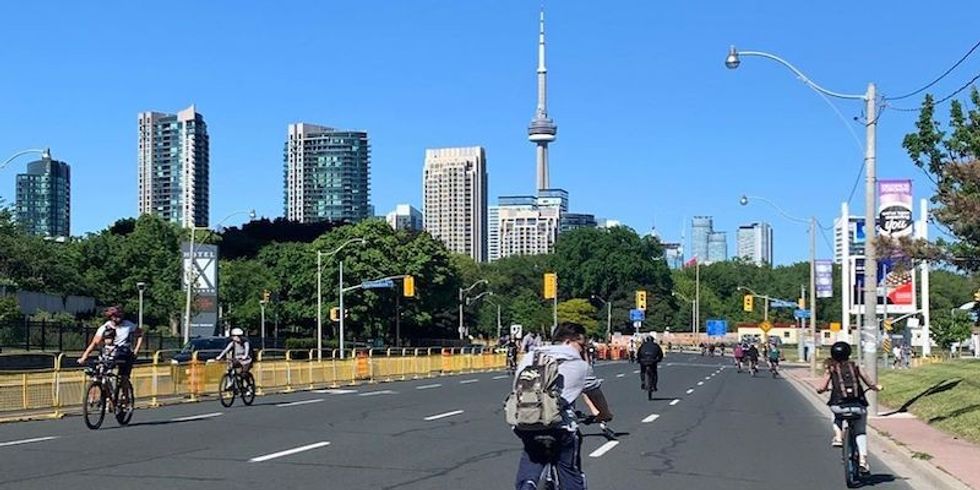Toronto is ramping up its cycling game.
Yesterday, the City of Toronto released the staff report Cycling Network Plan: 2022 Cycling Infrastructure Installation - First Quarter and 2021 ActiveTO Cycling Network Expansion Project Updates.
Appeasing the city’s growing number of cyclists -- especially at a time when many are returning to the office and gas prices remain sky-high -- the report outlines recommendations to grow, connect, and renew parts of Toronto’s cycling network. The move is aligned with the City Council’s TransformTO Climate Action Strategy and the Vision Zero Road Safety Plan, the City highlights.
According to a City-issued press release, the projects “take a complete street approach and include cycling, pedestrian, and motor vehicle safety improvements, including protected bikeways, curb extensions, new sidewalk installations, new signals, dedicated turn lanes, and other adjustments to motor vehicle lanes.”
Notably, the report recommends the installation of 10 kilometres of new bikeways and improvements on five kilometres of existing bikeways, where design and consultation have been completed. The projects are planned for installation from 2022 to 2024.
The report includes the following projects: Bartlett-Havelock-Gladstone Cycling Connections, College Street Upgrades, Douro-Wellington Cycling Connections, Knox Avenue Cycling Connections, Sentinel Road Safety Improvements, Steeles Avenue East Complete Street, The Queensway Complete Street, and Sheppard Avenue-Willowdale Avenue Road Resurfacing Opportunities.

The 2022 cycling infrastructure installation comes on the heels of the largest one-year expansion of Toronto’s bike network. According to the City, from 2019 to 2021, 65 kilometres of bikeways have been installed (including ActiveTO routes), as well as 47 kilometres of upgrades and enhancements to existing cycling routes.
While ActiveTO was introduced in May 2020 as a quick-start pandemic response program to offer temporary bike routes to get city residents outdoors, seven of the ActiveTO Cycling Network Expansion projects installed in 2020 were made permanent in December 2021. Two additional corridors were installed in 2021, Yonge Street from Davisville Avenue to Bloor Street and Bayview Avenue from River Street to Front Street East.
The report summarizes a preliminary evaluation of the two temporary ActiveTO Cycling Network Expansion projects on Midtown Yonge Street and Bayview Avenue East and recommends the temporary pilot periods be extended to July 2023. In advance of this date, the City’s Transportation Services Division will report to the Infrastructure and Environment Committee and City Council on additional data, evaluation, and recommendations on the future of the two temporary projects.
In a climate of increasing density with each shiny new condo, the return of the in-person office culture, and an unwillingness to part with the car (especially for those who moved outside of the city confines in the past two years) -- coupled with the return of the maddening traffic that plagued city streets pre-pandemic -- it's not surprising if Toronto drivers aren't thrilled with the news.
Whether more bike lanes -- for all of their undeniable benefits -- will help or hinder the city's logistical woes will remain to be seen.
In the meantime, the report will be considered by the Infrastructure and Environment Committee on Tuesday, March 29.





















